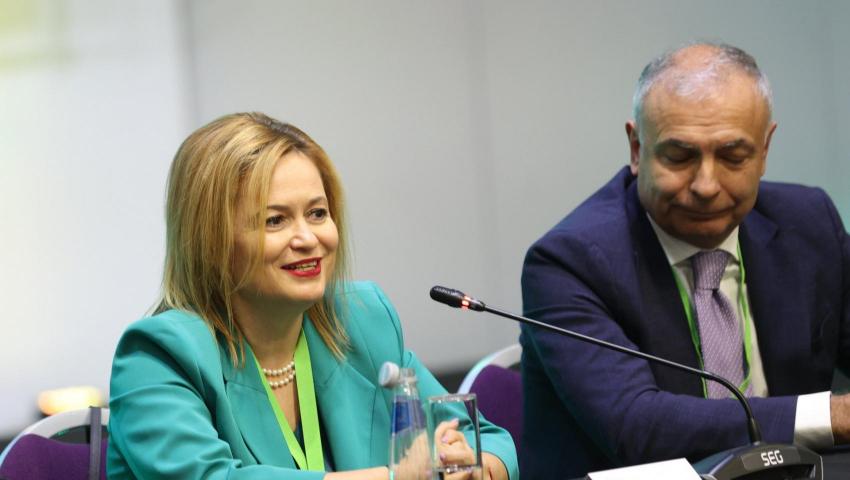Teodora Georgieva, ICGB: The lack of EU subsidies puts gas security in question

European legislation does not provide for subsidizing gas infrastructure. There is a lack of transitional regulation, a smooth transition mechanism, and more flexible solutions from the EU, which are of vital importance in the conditions of unprecedented geopolitical dynamics for business.
This was said by Teodora Georgieva, Executive Director of ICGB, in the panel "The Role of Natural Gas and Transition Fuels. Gas Networks and Energy Security". The discussion was part of the second day of the Green Transition Forum 5.0. The largest transformation event in Central and Eastern Europe was held from June 16 to 20 at the Sofia Event Center. The organizers were Green Transition Forum, Dir.bg and 3E-news.net.
The discussion focused on natural gas in the energy transition, improving regional energy security through interconnected gas networks, the role of transitional fuels - natural gas, biofuels, e-fuels, synthetic fuels, best practices for cross-border cooperation and infrastructure development, the role of LNG in the EU's energy security and supply chains.
Together with Teodora Georgieva, the discussion was also attended by Vladimir Malinov, CEO, Bulgartransgaz; Predrag Grujicic, Head of the Gas Department at the Energy Community Secretariat; Peter Fildyshev, Head of Gas Trading and Operations, MET Energy Trading Bulgaria; Murad Heydarov, Executive Director for the Balkans, Socar; Dmytro Lipa, Advisor to the CEO, Energy Company of Ukraine; Szabolcs I. Ferenc, Chairman-CEO, FGSZ Natural Gas Transmission; Svetoslav Benchev, Chairman, Bulgarian Oil and Gas Association; Maria Krasteva, Executive Director, Bulgarian Gas Association.
The panel was moderated by Claudia Patricolo, energy and climate journalist.
In her presentation, Teodora Georgieva outlined the transformative role of the Greece-Bulgaria Interconnector (IGB), describing it not just as a pipeline, but as a "cornerstone" of two strategic energy routes - the Southern Gas Corridor and the Vertical Gas Corridor.
"The role of the IGB is key because it provides the connection with the Trans-Adriatic Pipeline (TAP) and the actual supplies of Azerbaijani gas. Today, over 40% of Bulgaria's consumption is provided by Azerbaijan through our interconnector, which is a clear sign of real diversification," Georgieva emphasized.
She recalled that the start of the IGB operation in 2022 was a kind of "baptism of battle", just months after the start of the Russian invasion of Ukraine. "The interconnector immediately proved its decisive role. It not only guaranteed the energy security of Bulgaria, but also became a lifeline for the entire region, supporting countries in difficulty such as Moldova and Ukraine. It was then, for the first time in history, that the Trans-Balkan Gas Pipeline was activated in reverse mode - an achievement that solved problems that had been dragging on for years," said the ICGB Executive Director.
Despite its proven strategic importance, the future development of key gas infrastructures such as the IGB faces a lack of adequate European support despite the huge need for security.
"We are talking about a newly completed infrastructure, designed to ensure long-term stability and functionality for a period of at least 40 years. But European legislation does not provide for gas infrastructure to be subsidized by the EU. As a public-private partnership, we face a serious challenge - to ensure energy security and develop IGB without EU support. There is a lack of transitional regulation, a smooth transition mechanism, and more flexible solutions from the EU, which I believe are of vital importance today," Georgieva said, adding: "We are talking about geopolitical dynamics that have never happened before."
She linked this problem to the broader context of European competitiveness, citing calls by leaders such as Mario Draghi and Enrico Letta for a more dynamic and decisive European Union, capable of competing with the US and China.
In response to a question from moderator Claudia Patricolo about specific market mechanisms for abandoning Russian gas, Georgieva presented the concept of the so-called "route products" - an innovative tool proactively created by operators.
"This is a flexible product that provides a unified solution through which network users can book capacity at once along the entire route - for example, from a terminal in Greece to a storage facility in Ukraine. The first such route has already been introduced, and IGB has a key role in routes 2 and 3 respectively with connectivity via the LNG terminal in Alexandroupolis and TAP for the markets in Central and Eastern Europe, she explained. This is a clear example of how operators do not wait, but create solutions themselves in the absence of an adequate top-down regulatory framework.
Teodora Georgieva also paid special attention to the market reality related to liquefied natural gas (LNG). "Huge new quantities of LNG are coming from the US, but the key question is where is the demand? The market currently prefers short-term, spot deals, instead of long-term contracts, which are necessary to guarantee large infrastructure investments," she commented.
As a specific example of a problem that undermines trust and planning, Teodora Georgieva pointed to the delay of the LNG terminal in Alexandroupolis:
"Such cases undermine the trust of users and directly affect the planning of projects such as the IGB expansion."
In conclusion, Teodora Georgieva's message was clear - regional operators act, innovate and cooperate. "We are not waiting. Together with our partners from the Vertical Corridor, we are actively creating solutions, such as increased capacities and innovative products. We are actively encouraging both Ukraine and Moldova to become part of this corridor. These regional initiatives are the best example that Europe should support and learn from," she said.
According to her, the ball is now in Brussels' court, which must provide the necessary regulatory predictability and support to turn these regional successes into a continental strategic advantage. Only in this way can Europe remain competitive and energy secure in an increasingly uncertain world, Teodora Georgieva emphasized.
